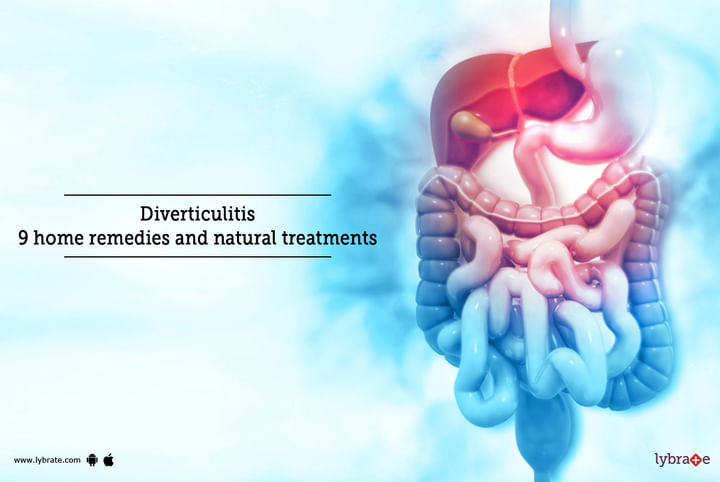Diverticulitis: 9 home remedies and natural treatments
What is Diverticulitis?
Diverticulitis is a chronic digestive disorder that is characterised by the inflammation of an out-pouch on the colon wall. These pouches are known as diverticula and contain bacteria, leading to bacterial infection and subsequent inflammation.
What are the signs and symptoms of Diverticulitis?
The most common signs and symptoms of diverticular disease or diverticulitis include:
-
Abdominal pain, usually on the left lower side, can range from mild to very severe.
-
Changes in bowel habits such as constipation or loose stools.
-
Nausea and vomiting.
-
Bloating or a feeling of abdominal fullness.
-
Fever with chills and sweats.
-
Blood in the stool or rectal bleeding which can occur if the diverticulum becomes infected or inflamed causing a small tear in the colon wall.
In more serious cases, an individual may experience complications such as abdominal abscesses, intestinal obstruction and peritonitis—which is an infection caused by bacteria from an infected diverticulum in the abdomen spilling into other tissues and organs.
What are possible complications of Diverticulitis?
-
Abscesses: Severe diverticulitis can lead to the formation of an abscess, which is a collection of pus that builds up in the diseased area. This can cause severe cramping and pain. In some cases, surgery may be necessary to remove an abscess.
-
Internal Bleeding and Anaemia: Diverticular disease can cause internal bleeding in rare cases, leading to symptoms such as nausea, dizziness and fainting. If bleeding is severe enough it can result in anaemia or even death if left untreated.
-
Bowel Obstruction: The swelling and inflammation caused by diverticulitis can sometimes lead to a blockage in the intestines that prevents food from moving through properly or at all in some cases. This can cause abdominal pain, constipation and bloating that won’t go away with diet changes or antispasmodic medication.
-
Peritonitis: Peritonitis is an infection of the membrane that lines the wall of the abdomen (peritoneum) and is a possible complication of diverticulitis.
Diverticulitis: 9 home remedies and natural treatments
-
Avoid consuming foods that are difficult to digest, such as dairy products, oily and fried foods, and heavy meats.
-
Drink triphala tea made with 1 teaspoon of triphala powder boiled in 8 ounces of water twice daily.
-
Consume warm soups made with easily digested herbs such as asafoetida, cumin seed, ginger root, coriander and fenugreek.
-
Herbal teas such as chamomile or peppermint may provide relief from pain and inflammation associated with diverticulitis. They also soothe the digestive tract, reduce cramping, and ease constipation.
-
Have ayurvedic therapies such as Panchakarma (cleansing therapy), which helps remove toxins from the body and improve digestion.
-
Increase your intake of high fibre fruits and vegetables like kale, apples, carrots and bananas.
-
Exercise regularly to maintain healthy weight to prevent pressure on your intestines, leading to diverticular disease complications; walking or jogging are sufficient forms of exercise if a more rigorous form is not possible due to pain or reduced mobility associated with diverticulitis symptoms.
-
Stress reduction is essential for diversional health; regular relaxation programs like yoga reduce stress hormones that induce immune system incompetence leading way for microbial infections around the bowel area (diverticular disease causes).
-
Water is always best but other healthy drinks including teas are beneficial too. Drinking eight glasses of water minimum per day helps flush out toxins while keeping your organs hydrated—a key factor in avoiding diverticula growth over time.
What are the surgical treatments for Diverticulitis?
-
Surgical resection: This involves surgically removing the affected section of the colon and reconnecting the remaining healthy sections. This is typically done in cases with severe disease or recurrent problems.
-
Bowel resection: This procedure involves surgically removing an affected part of the bowel and reattaching them to restore intestinal continuity. This may be an option for people with diverticulitis who are in constant pain, or have a higher risk (due to age or other factors) of complications from surgery.
-
Diverticulopexy: During this procedure, healthy parts of the intestine are sutured together to create a seal around areas of diverticulitis in order to prevent leaks and to seal any weakened areas where infection may be occurring.
-
Diverticular excision: A portion of the diseased bowel is removed and replaced with healthy tissue, allowing for better healing after surgery; however it carries an increased risk for leakage around where it was reattached due to having fewer layers for repair than resections do.
-
Colostomy/ileostomy: A colostomy or ileostomy is generally considered a last resort because they involve creating an opening in the abdomen through which waste can exit instead of exiting through the rectum into a toilet bowl, as is usually intended by nature; they require additional care to maintain both hygiene and optimal digestive health outcomes and transition back into regular daily habits can be challenging initially post-operatively.
Best doctors to consult for Diverticulitis?
-
General Practitioner: A general practitioner (GP) is a good starting point to discuss your symptoms of diverticulitis and determine appropriate medical care. Your GP can provide both medical advice and referrals to specialised doctors, tests, and treatments as needed.
-
Gastroenterologist: A gastroenterologist is highly trained in diagnosing and treating digestive disorders- making them a great choice for those suffering from diverticulitis. They will know how to properly diagnose the condition and can suggest the best treatment plan for your symptoms.
-
Colorectal Surgeon: A colorectal surgeon specialises in surgery of the colon and rectum- so they would be an excellent choice for those with severe or recurrent diverticulitis that may require surgical treatment such as removal of part of the colon or re-sectioning of affected areas.
-
Nutritionist/ Dietitian: Consulting with a nutritionist or dietitian is also important to managing this condition because eating certain foods can increase your risk for diverticular disease or create complications if you already have it. A dietician can recommend lifestyle changes to help manage your symptoms including changes in dietary fibre, avoiding certain foods that are high in fat like red meat, limiting fried foods, etc



+1.svg)
